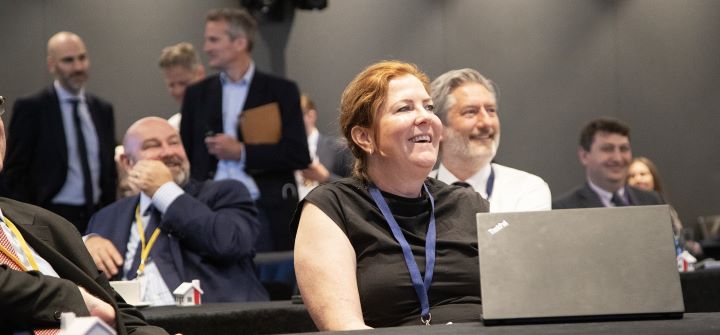The role of private markets in enhancing environmental, social and governance standards was a key theme dominating Room151’s Private Markets Forum, which took place on 21 June at London Stock Exchange.
Natural Capital- Restoring systems
One aspect of the debate were opportunities in natural capital, including natural resources such as water or forestry. Olly Hughes, managing director, forestry at Gresham House, highlighted that the asset class is often overlooked as a valuable investment, despite being valued around £125trn.
While biodiversity and nature have long been living in the shadow of the broader decarbonisation agenda; Jessica Pilz, head of sustainable investing, private markets at Fiera Capital, outlined how natural capital plays an important role in carbon offsetting. She illustrated how initiatives such as through afforestation, reforestation, soil carbon sequestration and peatland restoration can play a role in tackling climate change.
“All three of these solution store and sequester carbon in these natural ecosystems and that’s what we’re aiming to do. We aim to restore these systems so that we can better remove carbon from other emission sources,” she said.
Sherief Loutfy, head of pension investments, treasury management and banking at Worcestershire Pension Fund, stated that natural capital has allowed the £3.6bn fund to deliver on its “strong ESG ethos”. Currently, Worcestershire has invested £150m into forestry and is looking to allocate capital towards biodiversity.
“It’s really important for us to look at the natural capital allocation as an investment. So yes, we feel that we’re doing the ‘right thing’ but also the return that we’re looking for is important to us. And the returns that we can foresee coming from our natural capital investments sit nicely within the rest of our portfolio,” Loutfy added.
Jacqueline Jackson, head of responsible investment at London CIV added that natural capital plays a “critical role” in the LGPS pension pool achieving its net zero by 2040 target.
However, she ended the discussion by warning delegates that natural capital risk is interconnected to climate change, with the Cambridge Institute of Sustainable Leadership assessing the risk to natural capital erosion at $10trn by 2050. “So, there is a huge value of risk,” she added.
Net zero opportunities – real world impact
The theme of climate change was followed up by a panel session looking at the investment opportunities that arise from following a net zero investment strategy.
Barney Coles managing director, co-head of clean energy at Capital Dynamics, kicked off the debate by highlighting the scale of the energy transition required and the importance of investing in infrastructure that corresponded to the UK’s current use of energy use.
Coles highlighted green hydrogen as one of the key investment opportunities in the renewable energy transition, though he acknowledged that its rollout might take longer than anticipated. Supporting the renewable energy capacity of the grid by investing in battery storage is also a theme Capital Dynamics is looking at.
Mark Lyon, deputy CIO at Border to Coast, followed up on the theme of energy transition by outlining the key aspects of the pool’s £12bn Private Market portfolio and its approach to reaching net zero. In addition to a £4bn renewable energy strategy, the pool has also last year launched a climate opportunities strategy which looks at investments to support the transition to a low carbon economy, including assets such as private debt and forestry.
In addition to supporting the energy transition, the pool also invests in technology that helps to reduce the carbon footprint of high carbon emitting sectors, leading to the portfolio being still relatively carbon heavy. “We’re not just looking at achieving a low carbon number, we want to have real world impact,” Lyon explained.
The theme of real world impact was followed up by Neil Mason, assistant director – LGPS senior officer for the Surrey Pension Fund, which is part of Border to Coast and has recently confirmed its Net Zero Strategy.
He warned that even 2050 would be a challenging target, if real world impact was the goal. But he also added that private markets could potentially be a “vanguard” in achieving net zero targets. “With the GP’s we are so much closer to decision makers in the business” he stressed.
_____________________________________________________________________________________
Room151’s 4th LGPS Investment Forum
8th November, 2023, London FREE for LGPS Practitioners
_____________________________________________________________________________________
Housing investments- Inflation pitfalls
The penultimate panel at the conference covered housing investments. With rising interest rates putting pressure on landlords and local authorities alike, the need for affordable living spaces has gained renewed urgency.
Adrian D’Enrico, fund manager, funding affordable homes at Edmond de Rothschild Asset Management, explained that the “dire” situation in housing is only going to get worse as the population grows. He stressed that building new housing was the only way to solve this crisis.
Emma Gullifer, fund manager at Columbia Threadneedle Investments, highlighted the potential of housing investments to offer inflation protection.
Inflation and the risk that it presents to housing investments was also highlighted by Paddy Dowdall, assistant executive director at the Greater Manchester Pension Fund. He warned delegates that in the early stages of housing investments having high levels of inflation can represent a pitfall as landlords can’t label a house as “affordable” and subsequently increase the rent due to rising costs.
John Raisin, independent advisor at John Raisin Financial Services Limited, ended the panel by advising investors to make sure they keep their newbuild housing “in order” and “fit for purpose”, otherwise the “investment can go downhill very quickly if you’re not careful”.
Levelling Up
A day of debates was wrapped up with one of the most hotly debated items on the LGPS’s investment agenda: The government’s Levelling Up agenda and the potential role of LGPS investors in providing capital to fund the regeneration of historically underfunded areas in the UK.
George Graham, director of the South Yorkshire Pension Fund kicked off the debate by reinforcing that the concept of Levelling Up was by no means new. The fund has put 5% of its portfolio aside to invest directly into projects supporting projects in South Yorkshire as well as other communities highlighted in the Levelling Up Whitepaper.
But Graham also added that these investments had to be in the beneficial to the fund. “The important thing is that this is investment, it might be investment with a purpose but it is still investment,” he stressed. Consequently, it might be more labour intensive to implement but it should not be more risky than other assets, Graham emphasised.
Stephen Wild, head of pensions & treasury at OneSource, outlined how Havering and Newham Council, the funds he worked with, have increasingly started to prioritise investments in social housing.
“Investing in housing is not the panacea that people think it is, particularly not at the social end, so we had to be familiar with not just the advantages but also the potential pitfalls,” he said. The funds have now invested in projects which are aimed at helping people get out of temporary accommodation. He stressed that investors should always be mindful of local housing strategies in order to not drive up prices in the region.
Anne Copeland, co-head of social infrastructure at AlphaReal, made the case that investing in infrastructure should be a boring investment: “My aim should not be to surprise you,” she told the audience. She also stressed the opportunity of establishing strong governance standards with data and reporting having improved dramatically.
Speaking from an allocator perspective, Bola Tobun, treasury & pensions manager at the London Borough of Harrow, highlighted the challenges of sourcing suitable investments that align with the United Nation’s Sustainable Development Goals.
She stressed that some smaller funds have been deterred by higher management fees in private markets, but that pools have helped to make the asset class more accessible. “It would be good to have public impact investments, if the government can help on that area and provide a fund structure we can all invest in, that would make our lives easier,” she suggested.
Her suggestion was challenged by Graham: “The last thing we want is the government giving us some good ideas, that is unlikely to result in optimal outcomes but I think pools can be part of the solution here.”
Reporting by Mona Dohle and Aysha Gilmore.
—————
FREE weekly newsletters
Subscribe to Room151 Newsletters
Follow us on LinkedIn
Follow us here
Monthly Online Treasury Briefing
Sign up here with a .gov.uk email address
Room151 Webinars
Visit the Room151 channel














